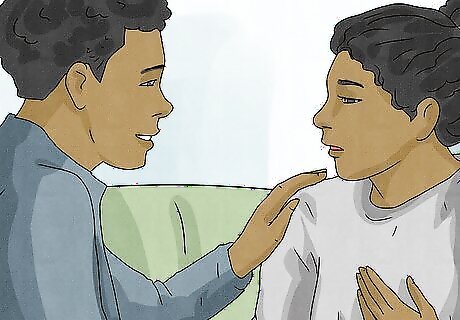
views
Watching for Signs

Consider why you want to know this information. Before trying to determine if a family member is LGBT, figure out why you want to know. Just because you're a family member doesn't mean you're obligated to know about someone's gender or sexual orientation - in fact, being a family member may make this person scared to come out to you. Try to determine why you want to know your family member's status in the LGBT community. For example, are you a sibling to someone you suspect to be LGBT and have unsupportive parents or guardians, or do you suspect they're getting bullied at school? If you plan on supporting your sibling if they are LGBT, then it may be worth finding out. Don't try and discover a family member's gender or sexual orientation if you just plan to tell other people or are "just curious". Somebody's sexuality or gender identity isn't something you absolutely need to know.

Avoid referring to stereotypes. Before trying to figure out if a family member is a member of the LGBT community, be sure that you aren't relying on stereotypes for your suspicions. If you just have a feeling that your brother is gay, that's okay. If you think your brother is gay because he watches a "girly" TV show or his voice sounds a certain way, that's relying on stereotypes. This doesn't mean that LGBT people can't fit stereotypes - it just means you shouldn't rely on them as your evidence for a family member's gender or sexuality. Your little sister fitting the "tomboy" stereotype doesn't mean she's transgender, but if he says to you that he's a boy, then he's a boy. Keep in mind that a person's gender or sexuality doesn't define how they dress or act. Someone who is asexual isn't any more likely to be cold and emotionless than someone who's straight. Someone who is a transgender girl may not be over-the-top girly and wear frills and bright pink all the time. These fall under stereotypes, too, so be sure to avoid referring to these.

Observe their behavior. When trying to determine your family member's gender or sexual orientation, you'll have to observe their behavior, both at home and in public. While around family, your child, sibling, or parent may try and hide any key behaviors, but look for subtle signs that may give you a clue as to their sexuality or gender identity. Do they get flustered around people of the same gender? Do they talk about a person of their gender a lot more than they talk about anyone else? This can be an indicator of a crush; however, keep in mind that people can be close friends and nothing more. Are they disinterested in having romantic relationships? For example, a cousin may express no interest in having a relationship when questioned about if they like anyone. Are they disinterested in sexual relationships with other people? Keep in mind that someone who is asexual may still be in a romantic relationship, but not be sexually involved with the person. Do they say that they don't see themselves getting married or being in a long-term relationship? If they are in a situation where they have to be assigned with one gender (such as needing to use a public restroom, or having a "boys versus girls" type of match in school), are they visibly uncomfortable with the side they have to be on? Do they outright refer to themselves as a "boy/girl" in a "girl/boy's" body, or make remarks such as "I should have been born a boy/girl"?

Keep an eye on their appearance. Appearance doesn't immediately signal that someone isn't straight, but it can be an indicator of a different gender identity. However, keep in mind that this isn't set in stone; someone's appearance does not define their gender identity, and definitely doesn't define their sexuality. Transgender girls may grow their hair out long, while transgender boys may cut it short. Those who don't fall in the gender binary may have any sort of haircut, however. Transgender boys may refuse to wear dresses or skirts. However, just because a family member dresses in jeans and a T-shirt doesn't mean they're a transgender boy. Transgender girls may wear dresses or skirts, but if the girl hasn't come out, she may not be able to do this. Don't snoop through a parent or sibling's closet to see if they have any clothing perceived as feminine - this is a major breach of trust, regardless of whether or not your family member catches you. Keep an eye on makeup usage. A transgender boy may refuse to wear makeup, whereas a transgender girl may test it out in secret. Nonbinary people may use makeup, too.

Examine their relationships with others. While the people that your family member associates with isn't necessarily a reflection on your family member, it can help to see if there's a pattern in who they choose to spend time with. Do they associate with mostly LGBT people? While being friends with LGBT people doesn't necessarily mean that your family member is part of the LGBT community, it can be a signal of something if your sibling or parent is actively seeking out LGBT friends. Do they seem more secretive when discussing a person of their gender? Crushes or relationships can cause a closeted LGBT person to clam up about someone they used to talk about more often. If your family member neither avoids nor seeks out romantic relationships or sexual relationships, they may be aromantic or asexual.

Don't jump to conclusions. It's important to realize that just because your family member meets some of the points in this list doesn't mean that they are LGBT. If you suspect your family member is a part of the LGBT community, then the best thing to do is wait and see if they come out. Jumping to conclusions or pressuring them to come out will only drive them away from you.
Accepting Your Family Member

Wait for them to come out. If you suspect that your family member is LGBT, don't pressure them about sexuality or gender at all. You can say supportive things about the LGBT community to encourage them to come out, but don't ask them about their gender or sexuality.

Listen. If your family member chooses to come out to you, the best thing you can do to help them is listen. If they are upset or need to rant when coming out to you, don't interrupt them unless absolutely necessary; it's best to just let them talk.

Be supportive and kind. After your family member comes out, let them know that you support them and ask them what they want to happen. If they have come out as transgender or nonbinary, switch to the pronouns they want to be called by, and if they changed their name, call them by that name, too. It's important to recognize that just because your family member came out to you doesn't mean that everything is okay. Discuss who else they want to come out to and when to do it. Do your best to make sure that your family member feels safe. Thank them for choosing to come out to you, and ask if there's anything you can do to make them feel supported. Do not tell them that this is "just a phase" or "something you'll get over". This will make them regret coming out to you, as these phrases are particularly unsupportive. If you live in a particularly homophobic or transphobic area, discuss safety plans with the family member in case of violence from others. While it's a scary thing to discuss, it's possible for your family member to get hurt by someone who isn't particularly accepting of sexuality or gender identity. Even if it doesn't escalate to physical violence, it's good to have a plan for dealing with bullying or verbal threats because of their LGBT status.

Don't bring it up more than necessary. After your family member has come out, avoid bringing up their gender or sexual orientation more than you have to. It may be a sore spot for them, and even if it isn't, think about it this way: if your family member was straight or cis, would you spend time bringing up the fact that they were straight or cis? If the answer is "no", then don't bring up their gender or sexuality.

Respect their relationships. If your family member has come out as gay or bisexual, accept that they will end up seeing someone of their own gender, and that's perfectly okay. Don't treat the partner any differently than you would treat someone of the opposite gender. Likewise, if your family member has come out as aromantic or asexual, don't pressure them to get in a relationship or look for a partner. There's no obligation for anyone to be in a relationship at any given time, especially if they don't want one. Don't go overboard with treating the partner kindly. If you know that your family member's partner is mistreating your family member or is pressuring them into activities that they don't want to do, don't be afraid to speak up and say something about it. If your sister has a girlfriend, treat that girlfriend no differently than if she was a boy. Don't let bad behavior slide just because of the partner's gender.

Keep an eye on the family member's state of mind. Statistically, 82 percent of LGBT people are harassed for their gender or sexuality. LGBT youth have also been said to think about suicide two to three times more than others who aren't LGBT. Regardless of your family member's age, keep an eye on how they're acting and help them if they show the warning signs of being suicidal or harming themselves.

Accept things the way they are. You might be feeling mixed up about your family member coming out as LGBT, especially if you aren't LGBT yourself. You might feel disappointed, angry, scared, weirded out, or just confused. Don't be afraid to research being gay, bisexual, transgender, asexual, or whatever your family member came out as. At the core of it all, what matters is that everyone is happy and gets to be themselves. Reader Poll: We asked 501 wikiHow readers to tell us how they would respond if someone reacted negatively to them coming out, and only 8% agreed they would ask someone close to them to help change their mind. [Take Poll] So, while that may not be a great strategy according to our readers, try to give them time to digest the news on their own terms.




















Comments
0 comment